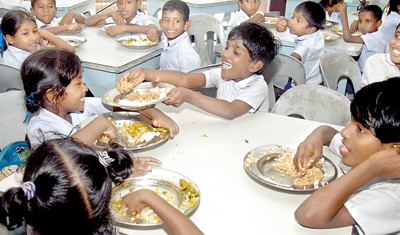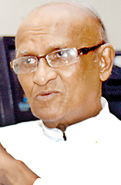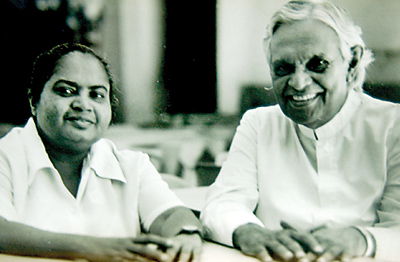Sunday Times 2
Samata Sarana : Scent of selfless love from former rubbish dump
It’s hard to believe that the solid five-storeyed building on Mutwal’s Aluthmawatha rose from a rubbish dump. But then the story of ‘Samata Sarana’ (Help for all) which celebrates its 25th anniversary on October 1 is all about faith.

Caring and sharing: Children enjoying a nutritious lunch at Samata Sarana. Pix by Nilan Maligaspe
Every weekday, some 500 people, from the very young to the very old from the neighbouring areas of Bloemendhal railway line, De La Salle beach, Mosque Lane beach, Kimbulawela, Mahawatte, Somalia watte and Weligoda watte come to Samata Sarana, leaving their burdens of poverty and hunger behind. They eat, bathe, study and laugh together here — people of all faiths and ethnicities. Those who cannot come are visited by the centre’s helpers.
The beginnings of this service were very small, says one of Samata Sarana’s founders, Fr. Joe de Mel, recalling how it was a personal vocation of Sister Bernie Silva, SCJM. Visiting the slum families of Mutwal she felt the need to expand their assistance to this disadvantaged community. She enlisted the help of seven young women and sent them out to find out what exactly the people’s basic needs were. Education, health and nutrition were the answers.
Sr. Bernie went to her counsellor Fr. Joe for guidance and in 1988, they managed to get a place at the De La Salle Brothers building in Mutwal to set up a crèche for working mothers to leave their children, provide nutritious meals and where they could hold a regular medical clinic. Their focus was the family, their target groups the persons suffering most — the children and the neglected elders.
The children were sorely in need of help; they were anaemic, malnourished, afflicted with skin and bowel diseases — “in very bad shape” recalls Fr. Joe. As needy were the elders. Their children couldn’t look after them –there was no room in their homes. So they hit upon the idea of providing day care for the elders. Today, 35 men and 35 women are registered as guests at Samata Sarana. They arrive each morning, as early as 6.30 a.m., have breakfast, a hot bath if they wish, lunch and tea, and relax in the company of their peers. Clothing and medical facilities too are provided and Fr. Joe recalls how another nun, Sister Edel Peiris, had gone round collecting medicines in the early days. Now at a twice weekly clinic they can consult doctors and get their medication free.

Samata Sarana’s Executive Director Fr. Leo Perera
All went well for a few years until the De La Salle Brothers needed the building for work of their own. It was a crisis, says Fr. Joe, recalling how he met the then Colombo Mayor and told him ‘we are looking after your poor, find us a place’. The Mayor was sympathetic but all he could offer was the site of Mutwal’s stinking garbage dump. It was a fair sized plot, formerly a quarry, some 50 perches slap on Aluthmawatha but garbage was piled high as the building now stands.
As providence would have it, they had by then had a visitor from the United States Embassy who had been so impressed with their work that he had got USAID involved. USAID stepped in with funding for the first two floors of the new building followed by generous support from others. Over the years, the European Union, NORAD, the German Embassy, the Australian and British High Commissions, UNICEF, the Save the Children Fund and many other organisations have all been by their side. And so a five-storeyed building took shape.
With the new building, the dimension of assistance to the poor expanded and so too, their capacity to render a real service with more funds coming in. They got running expenses for two years from USAID which helped set up the office and even sent advisors. “We ourselves got educated,” chuckles Fr. Joe, “it was a big learning curve.”
Still it was Sister Bernie’s vision, indomitable spirit and addiction to hard work that drove Samata Sarana, says Fr. Joe, revealing that though she had suffered from lupus from the time she was 17 or 18, her illness never deterred her. She lived on the premises which meant there was no real ‘off-time’ and the programmes grew — for battered women, single parents, prostitutes, all seeking to empower and uplift them.
When the tsunami hit in 2004, they were able to step in and help the community they were so much a part of, rebuilding 1,400 houses from the Colombo harbour to the Kelani river with the assistance of World Vision and World Vision New Zealand. The new houses were a far cry from the ramshackle huts the people had called home — these had water, electricity and toilets.
A paper plane sails overhead as we enter Samata Sarana, children dashing past on their way to classes. Samata Sarana’s school was started for children from the area who are so poor they cannot afford to attend ‘normal’ school’. Here education apart, their food, hygiene and medical needs are all taken care of. From Grade 6, some move on to regular schools, still supported. The Samata Sarana bus picks them up from home, brings them over for breakfast before dropping them off at school. After school they have lunch and tuition classes, all in an effort to keep them on track.

Founders: Sister Bernie Silva and Fr. Joe de Mel
At the crèche downstairs is a group of pre-schoolers, bare-bodied in the noonday heat, getting ready for their afternoon nap in in a row of individual cots. Nearby, the elders are already in siesta mode, some reclining on beds, others chatting or watching TV. We meet Philomena Dalpathado of Modera. She has been coming here for the past six years. It is a haven, she says, and the meal she gets to take home every afternoon eases the worry about food.
It is the children and elders that Terry Fernando, the kindly pharmacist at Samata Sarana for the past 22 years cares for primarily, dispensing medication and liberal doses of TLC. Ms. Fernando works on a voluntary basis and now lives on the premises, going home to her children and grandchildren over the weekends. “I do God’s work here,” she smiles.
Upstairs in the vocational training room, a bunch of bright-eyed girls are in the final stages of a nine-month course in sewing and embroidery. Some have gone to school here, others attended Wolvendaal Balika Maha Vidyalaya. After their O’Ls they thought of sewing as an option and are now hopeful they can set up their own businesses with a little help from Samata Sarana.
There are umpteen requests for help that flow in and Fr. Joe is categorical that they should never refuse anyone in need; at the very least give them a patient hearing. “The person who comes here has the same dignity you and I have….If someone is in need and I didn’t help him, it’s my problem,” he says, adding “Christ said ‘whatever you do for the least of my brothers, you do unto me’.” It irks him that the general attitude towards the poor is coloured by mistrust and suspicion.
With the creche, the pre-school, school, the elders’ centre all functioning smoothly, and another branch of Samata Sarana begun at Kindigoda in 2002, Fr. Joe at 85, is pondering the possibility of opening a night shelter for vagrants, somewhere they could sleep, have some breakfast and a bath and leave in the morning. A soup kitchen is also an option, he smiles.
An ever-present reminder of what all this costs hangs on the office wall. Rs. 80,000 is needed daily (Rs. 26.8 million annually) to provide all the services at Samata Sarana. Somehow, the money comes in. “If there is a need, help. God will provide the resources necessary” was Sister Bernie’s guiding philosophy and theirs too.
Sister Bernie died in 2009 and Samata Sarana, an approved charity with a staff of 70 is now run by a board of directors instituted by the Catholic Church with the Archbishop as the Chairman and Fr. Joe as the Chairman’s nominee. Fr. Leo Perera, Samata Sarana’s Executive Director, is committed to continuing this journey of faith, sensitive to the needs of the poor and respecting their dignity. “Learn the values and priorities of the needy and neglected and learn to discern what is necessary for life and what is not essential,” he says, urging that we empty our minds of any notion that we are the ‘haves’ and can dole out but rather respond with compassion.
Now, however, it’s time for thanksgiving for the staff, supporters and the over 3,000 families Samata Sarana serves. On October 1, a Mass will be celebrated by the Cardinal at 9.15 a.m. followed by a concert and lunch. On October 5, the Papal Nuncio will be present at a celebration with the benefactors and on October 20, the children will present a concert and art exhibition. Time to look back then and marvel at the miraculous transformation of a rubbish dump.
comments powered by Disqus
